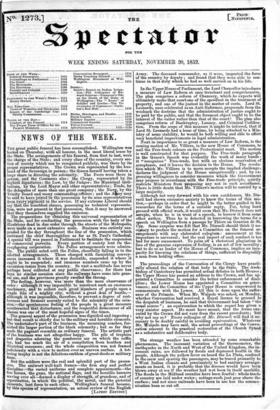NEWS OF THE WEEK.
TirE great public funeral has been accomplished. Wellington was buried on Thursday, with all honour, in the most literal sense by the State. The arrangements of his funeral, from first to last, were the charge of the State ; and every class of the country, every sec- tion of society which can be recognized publicly, was there by its proper representatives. The Crown was represented by the hus- band of the Sovereign in person ; the Queen herself having taken a large share in directing the solemnity. The Peers were there in peirson, and the Commons also ; the Clergy, represented by its highest dignitaries; he Law, by the Judges; the Municipal insti- tutions, by the Lord Mayor and other representatives ; Trade, by the delegates of more than one great company ; the Nevi-, by the Trinity Board and many commanding-officers; and the .4py may be said to have joined in the procession by its nine representatives from biery'regiment in the service. If any extreme Liberal should say quit the humblest classes, possessing no technical representa- tion, were not present in that procession, then it may be answered that they themselves supplied the omission.
The preparations for Obtaining this universal representation of
the State, and for conducting the procession with the body of the illustrious dead in due order through the streets of the Metropolis, were made on a most extensive scale. Business was entirely sus- pended for the day throughout the line of the procession which embraced the chief thoroughfare as far as St. Paul's Cathedral. A special bill was passed in Parliament to facilitate the suspension of commercial pursuits. Every portion of society lent its tho- roughgoing cooperation. The Police arrangements were admira- ble. The public acted with the Police, cheerfully falling in to the allotted arrangements. Those charged with furnishing convey- ances increased it where it was desirable, suspended it where it ought to be suspended; and immense numbers came up by the excursion-trains from the country. So vast a multitude has never perhaps been collected at any public observance; for there has been no similar occasion since the railways have come into gene- ral use, and the provinces greatly swelled the throng.
The feeling, however, was 'more than the mere observance of order : although it was impossible to construct such an enormous machinery, and to collect such "great "aumbers of people upon a single line of a mighty city, without. a great deal of bustle,— although it was impossible, therefore to prevent a degree of rest- lessness and ferment scarcely suited io the solerabity Of the ocba- sion,—the spontaneous feeling of the people in a great measure counteracted that disturbance, and the respectful demeanour of all classes was one of the most hopeful signs of the times. The general aspect of the procession was dignified and imposing ; but that result is chiefly due to the military and heraldic elements. The undertaker's part of the business, the mourning coaches, fur- nished the larger portion of the black solemnity ; but so far they made the pageant resemble an ordinary funeral. The artistic part of the business was not altogether happy. The pile of trophies and draperies adorning the ponderous car on which the coffin lay, had too much the air of a compilation from heathen and theatrical resources; and the whole composition was not framed Judiciously with a view to motion over an uneven surface. A tot- tering trophy is not the felicitous emblem of great deeds or military fame.
But the soldiers were the real and splendid part of the proces- sion. The stalwart well-knit frames—the firm step and perfect discipline—the varied uniforms and complete appointments—the fine horses, the guns, the national flags and the heraldic banners Waving over all—formed a display of strength, of grandeur, and of organization, in Whieh• the political, the moral, and the pictorial elements, lent force to each other. Wellington's funeral became, by this species of representation, an actual review of the English
Army. The deceased commander, as it were, inspected the force of the country by deputy ; and found that they were able to con- tinue in that duty which he had so well carried on in his life.


























